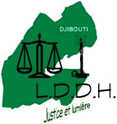12/01/07 (B377) LDDH : Amnesty condamne les bombardements US en Somalie.
 Le Président |
COMMUNIQUÉ La |
Amnesty International
a écrit au Gouvernement des Etats-Unis pour exprimer
leur profonde préoccupation après les massacres de 30 civils
suite aux
bombardements des Forces américaines à
partir de Djibouti.
Par-devers
des Autorités Officielles, ici encore en place à Djibouti,
gardent « le silence relatif » à tous les lots d’un silence
« payés »
portant sur les massacres de centaines de civils toujours et aujourd’hui
encore victimes de bombardements (terre-mer-air) en Somalie voisine. (Même
avec et après les Conférences de Paix en Somalie.)
Les souvenirs
des dernières Conférences d’Arta et de Nairobi sur des projets
de démantèlement (?) ne peuvent que continuer, malheureusement,
à favoriser
les chemins des violences mafieuses dans la Corne d’Afrique.
M. NOEL ABDI Jean-Paul
Press
release, 10/01/2007
SOMALIA:
CIVILIANS MUST NOT BE A CASUALTY OF THE CONFLICT IN SOMALIA
Amnesty
International today wrote to the US government expressing deep concern about
reports that at least 30 civilians have been killed in recent US air attacks
in southern Somalia.
Amnesty
International wrote to US Secretary of Defense Robert Gates urgently
requesting information about the airstrikes and an explanation of what
measures were taken by US forces to avoid civilian casualties during the
attacks.
"We
are concerned that civilians may have been killed as a result of a
failure to comply with international humanitarian law," said Claudio
Cordone, Senior Director of Amnesty International’s Research Programme.
"What
we want to know from the US government is whether their forces took
the necessary precautions to distinguish between civilians and combatants
when they chose the means and methods of their attack."
International
humanitarian law prohibits direct attacks on civilians or
civilian objects; attacks that do not distinguish between military targets
and civilians or civilian objects (indiscriminate attacks); and attacks
that, although aimed at a military target, have a disproportionate impact
on
civilians or civilian objects (disproportionate attacks.)
US authorities
have not released detailed information on the airstrikes in
Somalia. According to a Pentagon spokesperson, a US Air Force AC-130 gunship
was used in an airstrike on 7 January to target the "principal al-Qa’ida
leadership" operating in the southern part of Somalia.
Reports
suggest that the attack on Hayo village near Afmadow town targeted
three named al-Qa’ida operatives suspected of involvement in bombings of US
embassies in Kenya and Tanzania in 1998. It is unclear whether the three men
were killed in this attack. They were said to be located with fighters of
the Union of Islamic Courts, defeated in Mogadishu by Ethiopian forces
backing the Transitional Federal Government in fighting in late December.
Amnesty International also wrote to Kenyan authorities, urging them to
re-open their border — closed since 2 January — to refugees fleeing from
the conflict.
Tens of
thousands of people have been internally displaced by the ongoing
conflict in the south of Somalia, which is still badly affected by the late
2006 flood-related humanitarian crisis.
The Kenyan
government said that it was closing the border to prevent
fighters of the Union of Islamic Courts from entering Kenya pretending to
be
refugees.
"The
Kenyan government must distinguish between fighters and civilians and
abide by its obligations to genuine asylum-seekers under international law,"
said Claudio Cordone
